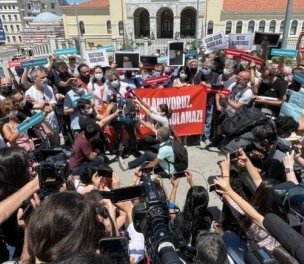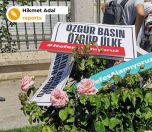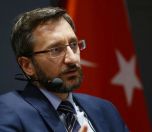* Photo: Pixabay
Click to read the article in Turkish
The Media Freedom Rapid Response (MFRR) and its partner organizations have expressed their concerns about and condemn recent statements by President and Justice and Development Party (AKP) Chair Recep Tayyip Erdoğan and other government officials pertaining to the introduction of new regulation of "fake" news and "foreign-funded" news in Turkey.
Releasing a joint statement, the international and domestic press freedom organizations have said, "Officials' targeting several critical and independent media outlets for securing funds abroad is a clear move to stifle further the free media in Turkey by controlling content." Accordingly, they have condemned the targeting remarks about the critical media outlets.
We call on the Turkish legislators to ensure that any new measures are fully in line with Turkey's obligations under domestic and international law that protect free speech and media pluralism.
What did Erdoğan say?On July 21, President and ruling AKP Chair Recep Tayyip Erdoğan Erdoğan, in an interview, was asked whether there is a law that envisages serious criminal sanctions for disseminating fake news through traditional and social media. In response, he announced that a study will be carried out in Parliament in October, after the summer recess, that will address the issue, building on the social media law that was passed last year. Erdoğan characterized fake news as a threat to Turkey's democracy on par with terrorism, in which opposition parties are implicated. The same day, the Presidential Communications Directorate announced that Parliament will take new legal steps against foreign funding of local media outlets "to ensure the people's access to accurate news". |
As indicated by the MFRR and its partner organizations, these statements were followed by a social media campaign targeting specific independent outlets such as Medyascope for receiving funds from the US-based Chrest Foundation. The organizations have said:
'A move to demonize the free media'
"Taken together, these statements create the impression that the Turkish government is preparing to introduce new legal measures that will further undermine media freedom and pluralism in the country.
"In relation to so-called fake news, we are concerned that enacting any kind of legal duty of "truth" will in practice amount to the creation of a new tool for government censorship: empowering public officials to decide what is true and what is not entails accepting that the authorities have a right to silence voices with whom they disagree.
"This prospect is especially worrisome in light of Turkey's poor track record in respecting freedom of speech and legitimate criticism of the authorities.
"Accordingly, as we recognize that the spread of disinformation and propaganda is, indeed, of concern, we urge that any measures to counter it must be based on international freedom of expression law and standards, such as those set out in the 2017 Joint Declaration on Freedom of Expression and 'Fake News', Disinformation and Propaganda.
"Furthermore, we note that funding media via (foreign) project funding has become an important source of income for many independent outlets in Turkey, as government pressure has intensified, including through the lack of local funds for media outlets critical of the government and uneven distribution of public advertising, as well as the imposition of fines and advertisement bans by media regulator Radio & TV Higher Council (RTÜK) and public advertising agency BIK.
"We are concerned that measures to restrict foreign funding or to paint its recipients as foreign propagandists, are a clear move to demonise the free media and will further increase the pressure on the few remaining independent outlets. Currently, more than 90 percent of domestic media are directly or indirectly controlled by the government or the ruling AKP."
The undersigned:
ARTICLE 19
Articolo21
Association of European Journalists (AEJ)
Association of Journalists, Ankara
Broadcast and Printing Press Workers Union of Turkey / DİSK Basın-İş
Committee to Protect Journalists (CPJ)
Danish PEN
English PEN
European Centre for Press and Media Freedom (ECPMF)
Free Press Unlimited (FPU)
IFEX
IFoX Initiative for Freedom of Expression – Turkey
IPS Communication Foundation
International Press Institute (IPI)
Journalists' Union of Turkey (TGS)
Media and Law Studies Association (MLSA)
Media Research Association (MEDAR)
OBC Transeuropa (OBCT)
PEN International
PEN Netherlands
PEN Vlaanderen
South East Europe Media Organisation (SEEMO)
Swedish PEN
Developing projects, receiving funds* A project can be defined as the work to be undertaken by organizations such as associations/ foundations and the institutions working in the fields of gender, children, education, violence, media, etc. The budget of this work is called "fund." * In some countries, citizens apply for "public funds" for such works, they receive their support from the state and realize their projects. In some countries, it is not possible for every organization to access "public funds." You apply for global organizations, primarily to the European Union (EU), with your projects. * If the application covering the activities, the projected outputs and expenditures is accepted, an agreement is signed. The payment is made to the bank. For Instance, if you are a foundation, you fill out the Foreign Grant Notification Form and upload it to the Foundation Information Management System https://vbys2.vgm.gov.tr/login.aspx of the General Directorate of Foundations' Foundation Services Department, together with the bank receipt of the fund. As the information regarding your project is also included in the Form, it is now known from the very first step onward why the fund is sent. * At this stage, your application is added to the list of "pending approval." If the person responsible for your foundation at the Regional Directorate of Foundations approves the fund, you start using it. You cannot withdraw the money from the bank without getting the related approval. In that case, you are being fined for this behavior. * The activities and expenditures of the project are made in line with the agreement signed with the funding institution. * Generally, annual activity and expenditure reports are prepared. * It is inspected by an internationally recognized audit company whether the expenditures are made in line with the activities and the standards indicated in the agreement. * The reports sent by the audit company are discussed and approved by the funding institution as well. * An income and expense report on all types of expenditures are submitted to the Revenue Office once a year (by March 30). * Together with the profit and loss account statement, it is also sent to the Regional Directorate of Foundations every year by June 30. * Moreover, in addition to all these procedures, the state can place associations and foundations under inspections and audits any time. European Union (EU) fundsIn addition to the Instrument for Pre-accession Assistance (IPA), which is the main financial support instrument, Turkey has been benefiting from the EU Facility for Refugees in Turkey (FRIT), the European Instrument for Democracy and Human Rights (EIDHR) and the EU's Instrument contributing to Stability and Peace (IcSP) within the frame of its financial cooperation with the EU. https://www.avrupa.info.tr/en/instrument-pre-accession-assistance-ipa-880 As Turkey is an official candidate for EU accession, the EU supports political and economic reforms in the country with financial and technical help through the IPA. These funds aim at aligning Turkish legislation and standards with the EU's, building authorities' capacity for undertaking this harmonisation, and implementing the reforms throughout the accession process. The ultimate aim of pre-accession funds is to improve the lives of individuals, by providing them with better opportunities and ensuring they enjoy standards equal to EU citizens. The EU has allocated €4,453.9 million under IPA 2014-2020 for Turkey. The priority sectors to be supported are: democracy and governance; the rule of law and fundamental rights; environment and climate action; transport; energy; competitiveness and innovation; education, employment, and social policies; agriculture and rural development; and regional and territorial cooperation. The EU has been providing funds to Turkey in the below fields. As can be seen here, the funds are principally given to non-governmental organizations: Supporting Reforms in Justice, Home Affairs and Fundamental Rights |
(PT/SD)








as.jpg)
